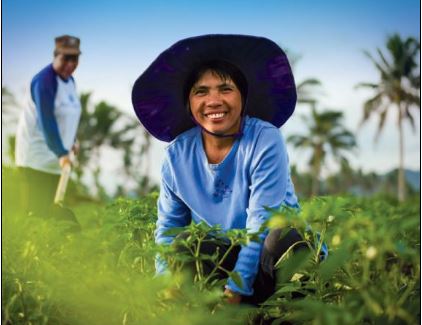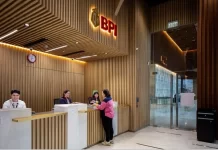The predicament of Wencelito Gomez was typical of a Filipino farmer in constant struggle to make a living. Like most of his peers in Nueva Ecija, he found it difficult to find a steady market for his crops. He even experienced watching helplessly as the onions harvested from his small piece of land rotted in storage or sold for as low as one peso per kilo.
Meanwhile, Jollibee Foods Corporation (JFC) was in search of reliable suppliers to provide raw materials for its products. The company was also aware that the farmers who produced fresh vegetables were also in need of a market. JFC saw the potential benefits of an Inclusive Business approach: Linking small farmers to the company’s supply chain to help increase their income.
Jollibee Foods Corporation provides steady market to small farmers
The challenge, however, was in small farmers’ capability to supply the big volumes of high-quality produce that Jollibee needed on a regular basis.
Thus the Farmer Entrepreneurship Program (FEP) came into being in 2008, to usher small farmers into the supply chain of JFC and other institutional markets. The program, initiated by the Jollibee Group Foundation (JGF) with its partners, looked into the realities of small farmers: small farm land size, traditional farming techniques, and limited access to production capital.
With support from government agencies, microfinance institutions, academe and non-government organizations, the FEP came up with various interventions to bridge the gap between small farmers and an institutional market such as JFC.
These interventions are organizing farmers to enable product consolidation and meet volume requirements; business coaching to ensure quality is sustained; and cost recording for farmers to account their production costs and project their income. These records became the basis for the farmers to take out loans and expand their operations.
In San Jose City, Nueva Ecija, one of the FEP pilot sites, Gomez and other onion farmers in Barangays Kaliwanagan and San Agustin joined to form the Kalasag Farmers Producers Cooperative and take part in the program. They underwent trainings on agro-enterprise development that prepare farmer-groups for them to be able to supply institutional markets, which include partnership building, market research, cluster formation, and actual market delivery.
In 2009, Kalasag began supplying JFC with white bulb onions. On its first attempt, the cooperative was unable to meet its commitment of 90 metric tons as heavy rains destroyed crops and a considerable amount of the produce ended up not meeting JFC’s product standard.
The following year, however, the Kalasag farmers bounced back and the cooperative was able to deliver 245 metric tons of onions.
The Kalasag farmers have since diversified product outputs to maximize use of their farms during the off-seasons for onions. In 2014, they began supplying chili peppers to JFC and was able to sustain year-round delivery.
Since 2011, they have also been supplying to other clients.
As explained by Gomez:
“JGF has been very generous and even supportive of our linkage to other companies. With their guidance, we are now supplying onions to CDO Foodsphere, Inc. and Splash Foods Corporation. We do not have to worry now as we have a ready market for our products. We can now plant more and more crops knowing we will be able to sell them, thanks to JGF.”
As of 2016, the 12 farmer groups in the country affiliated with FEP, including Kalasag, have delivered a total of 740 metric tons of produce to JFC. These include white onions, salad tomatoes, bell peppers, chili peppers, calamansi, and assorted vegetables. Some 20 percent of JFC’s vegetable requirements now come directly from farmer groups.
“We do not have to worry now as we have a ready market for our products. We can now plant more and more crops knowing we will be able to sell it, thanks to JGF.”
Gomez, who started with a one-hectare farm inherited from his father, was able to expand his land to five hectares by 2015.
He shares:
“Farming is the only source of money for my kids’ schooling. If not for the income I’m getting now, I won’t be able to send my children to school. My eldest is now a third year Accountancy student and the youngest is in Grade 10.”
The farmers’ increased yield and reduced costs translated into a better income for them and other members of the community. The farmers also gained confidence and can now see themselves as rightful business partners of large institutions. More importantly, they are willing to share what they have learned with other farmers wanting to become Business partners too.
“Farming is the only source of money for my kids’ schooling. If not for the income I’m getting now, I won’t be able to send to school my children. My eldest is now a third year Accountancy student and youngest is in Grade 10.”
In the process of helping the farmers, the JFC benefited as well. Having farmers directly supplying a significant percentage of its raw materials diversified its supply base and led to faster response time for urgent requirements. This initiative also made JFC employees even prouder to be part of the company.
Lastly, the FEP experience provided insights on doing Social Innovations to address systemic social issues like poverty and hunger. These include the advantage of focusing on what the business organization does well and the resources that are readily within its reach to maximize impact and ensure sustainability.
The program showed the importance of engaging various stakeholders, especially the government, to ensure success and scale up interventions that would benefit farmers and the broader communities where they are.
This story is part of a series of articles written by GO NEGOSYO writers being published by GoodNewsPilipinas.com as part of our support to Philippine businesses.














